Badzine had occasion to visit the hometown of some of the biggest names in world badminton earlier this month and was granted an exclusive interview with the youngest ever badminton World Champion…Jang Hye Ock.
Interview and photos by Don Hearn
It may have been 18 years ago that badminton’s youngest ever singles World Champion, Ratchanok Intanon, was born but it was just a few months after that, in fact, that a young Korean girl who had been eighteen herself for only three months and 19 days climbed atop the podium at the 1995 IBF World Badminton Championships in Lausanne, Switzerland, after beating along the way soon-to-be two-time Olympic champions Ge Fei and Gu Jun.
That 18-year-old, Jang Hye Ock (pictured), and her veteran partner Gil Young Ah, after winning both the All England and World Championship titles within the space of a few months, then set their sights on Olympic gold but came up just short in Atlanta in 1996, losing in the final to none other than China’s Ge and Gu. However, injuries in the years following her Olympic outing at age 19 meant that Jang Hye Ock would not enjoy the long and illustrious career of many of her team-mates.
She eventually made her way back to Jeonju, which is also the hometown of such greats as Park Joo Bong, Chung So Young, Kim Dong Moon, Ha Tae Kwon, Jung Jae Sung, and a whole host of Korea’s top players and coaches. However, Jang is perhaps the most famous Jeonju native shuttler to have also made Jeonju her home.
Badzine caught up with Jang Hye Ock on the occasion of Jeonju hosting its first international badminton tournament, the 2013 Korea Grand Prix Gold. In addition to service judge duties, Jang was also among the past stars who were honoured by the mayor of Jeonju in a televised ceremony on finals day.
Badzine: Your name has come up in discussions in the media this year as it turns out that you are still the youngest player ever to win a badminton World Championship in any category. Do you remember getting any attention when you won in Switzerland at age 18?
Jang Hye Ock: To be honest, I don’t have any memory of that ever coming up at the time. Of course, in those days, the level of attention to badminton in the media was very different. Now we have two badminton magazines in Korea. But at that time, you had the newspapers and that was about it. Also, it wasn’t as if you could just look up that sort of thing on the computer like you can today.
Badzine: This year, Ratchanok Intanon became the youngest ever singles champion at the World Championships but she has often been called simply the youngest ever World Champion even though she was a few months older than you were when you won. Does it bother you that she is being given a distinction that is rightfully yours?
Jang Hye Ock: Well, I hadn’t heard about Ratchanok being billed as the youngest ever World Champion and of course, I didn’t know that I was the youngest when I won so it couldn’t really bother me to have been denied some recognition.
I suppose it would make me feel good if suddenly my name started getting mentioned all over, if it became some kind of an issue, but it is okay with me if all the attention is on her.
Badzine: Do you personally think there is a big difference between reaching the very top, as you did, in women’s doubles as opposed to women’s singles?
Jang Hye Ock: Well, of course it’s different. In singles, you play the game the way you decide, while in doubles, you have to have teamwork and you have to consider what your partner needs and what she can do. If I’m hurt or having trouble, then I can’t just rest because what I do affects my partner as well so it’s not so simple.
In my case, all of my partners were older and more experienced. That meant that I was often under pressure to measure up to their expectations. If I was off my game, they would scold me for it. It may be different in other cultures but this certainly affected me when I was playing back then.
Badzine: One might think that being able to rely on a more experienced partner to lead the way would be a more certain route to success. However, it seems that, at least these days, the discipline where youngsters are having the most success is, by far, in women’s singles. Why do you think that would be?
Jang Hye Ock: It’s hard for me to comment on that as my experience is primarily in doubles. In my case, I had to deal with partners who were a lot older and more experienced. Of course, I had the fighting spirit and the strength so I wonder if that was how I was able to succeed in doubles.
Badzine: You had some amazing exploits all before you turned twenty but then it seems you retired very young. Why was that?
Jang Hye Ock: Yes, I was playing for another year after the Olympics and then I changed partners and played with [Ra] Kyung Min in two tournaments in Europe in 1998 but I was in a lot of pain from a hip injury so I left the national team.
I did keep playing domestically for my local team, almost right away but I really didn’t think about trying to return to the international game because my body just wouldn’t handle it.
Badzine: Jeonju is most famous for producing players such as Park Joo Bong, Kim Dong Moon, Ha Tae Kwon, and Jung Jae Sung. How much did that influence you as a young girl starting out in badminton here?
Jang Hye Ock: When I was growing up here in Jeonju, in addition to all the famous men from Jeonju, there was also Chung So Young, who was several years older than me. They were already famous when I started playing badminton but I still didn’t know who they were until after I started playing. Once I was part of the badminton fraternity, all the success they had achieved became something for me to admire and I of course wanted to accomplish all that they had.
The fact that some of our best players were from my home province certainly added to my belief and my desire to win like they did.
Badzine: How does it feel that your hometown is finally hosting a major international badminton event?
Jang Hye Ock: I think it’s great, especially for local people. It’s not so much who is participating. More than that, this is the second biggest tournament in Korea – I mean, the Korea Open Superseries is still the biggest – and the fact that it’s being held here means that to see such an event, people from Jeonbuk don’t have to go all the way up to Seoul. They can just come here to an event locally and watch great badminton so close to home.
Badzine: I believe you are now coaching at your own former high school. Is that important to you to work to help players at your alma mater?
Jang Hye Ock: Yes, I am now coaching at my alma mater, Seongshim Girls’ High School. Actually, I’d been playing in Jeonju, until recently, for the Jeonbuk Bank pro team for 3 or 4 years but I just gave birth to my second child so it became too much to continue as a player. Beginning to coach seemed natural at that point and I got hired by Seongshim so that has worked out well.
Badzine: It seems that the coaching you’ve done is mostly with younger players. Is that just because one normally begins by coaching youngsters or did you choose that because of some special connection with young players since that was the stage when you really distinguished yourself as a player?
Jang Hye Ock: Well, I did also coach the National Junior Team for about 3 years, back when [Lee] Yong Dae was on the team but it wasn’t really a conscious decision to focus on youngsters. Of course, I feel I have something to teach the youngsters but really, I learn from them too so I think it is a good match.
Badzine: What do you think are some of the differences between international badminton in the mid-nineties and the game or circuit today?
Jang Hye Ock: Well there are big differences in the game of course. I was so young when I played. I was paired with the older players and was really just following their lead so much of the time. There were a few high profile tournaments at that time, like the All England and the Japan Open but there wasn’t the same system like now where there is a whole circuit of tournaments with levels by prize money and so forth.
I remember, for example that Korea hadn’t had any World Champions in women’s doubles and I really wanted to add my name to the list of winners for a big tournament like that. I don’t have any memory of being motivated by money particularly, though. Actually, it was my mom who took care of the money I spent and won.
Badzine: Do you think the change in generations has produced young players who are more prepared to compete internationally?
Jang Hye Ock: Oh, I think the kids nowadays know a lot more. They play abroad and they know what the big events are and the different levels and where the biggest prize money is. I just don’t remember ever talking about that with the other players my age. We’d talk about playing and tell each other to try hard but we didn’t look at the big picture so much.
Badzine: A girl from your high school, Shin Seung Chan, last year won her second straight World Junior title. Does that kind of success mean more to you than even when other young Korean players do well?
Jang Hye Ock: Oh sure, it feels great for the alumnae, too, when a girl from our school does well. Seongshim was and still is one of the three most successful girls’ programmes, along with Sungji and Sungil, and when our successors do well, we feel especially proud.
When Seung Chan won, that was really important to me. She was very appreciative. My husband actually coached her too so of course we were both very proud of her when she won the World Juniors.
Badzine: What about you. You won the All England and the World Championships but did you not have any success at the World Juniors first?
Jang Hye Ock: The World Juniors? No, I played but I didn’t win. Gu Jun and Ge Fei of China were a couple of years ahead of me and I remember losing to one of them in the World Juniors, but I don’t recall exactly. Then, of course, I had to play them at the World Championships and the Olympics a few years later.
Badzine: What do you think the future holds for you as a badminton coach or for your players?
Jang Hye Ock: I’m happy now where I am, coaching the girls coming up through my alma mater. I don’t have any desire to coach at the national level or anything. They already have some very qualified and experienced men to take care of that and I have a family here and my youngest child is still very young.
I would really like to see some of my charges develop and break out onto the international scene. I think we have some who could wear the taegeuk flag on their uniforms someday as national team players. That would make me happy.
As for what the future holds for the World Championships, consider that the first worlds were held the year Jang Hye Ock was born and that just before she became the youngest ever World Champion at age 18 came the birth of Ratchanok Intanon, the youngest ever singles champion. Should history repeat itself, look for a young world-beater born in 2013 to emerge 18 years from now…
![Exclusive interview with the youngest ever badminton World Champion Badzine had occasion to visit the hometown of some of the biggest names in world badminton earlier this month and was granted an exclusive interview with the youngest ever badminton […]](http://www.badzine.net/wp-content/uploads/Newsflash-thumbnail.png)
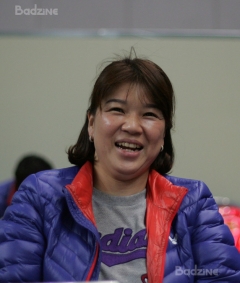
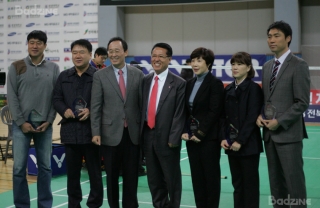
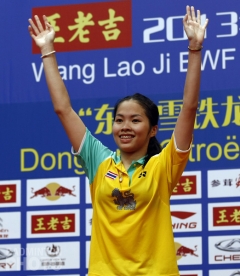
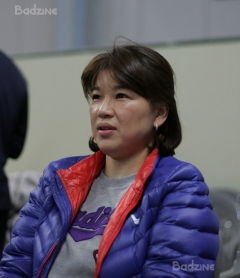
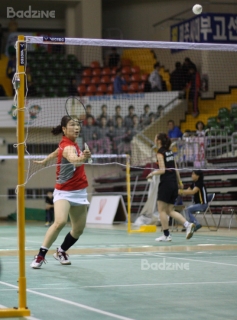
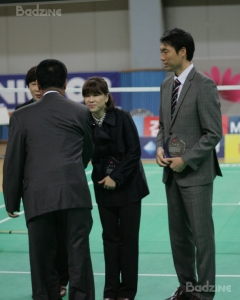
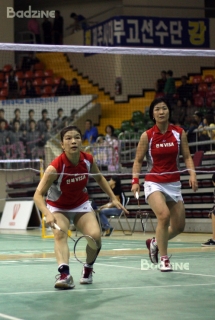
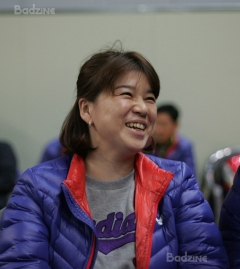

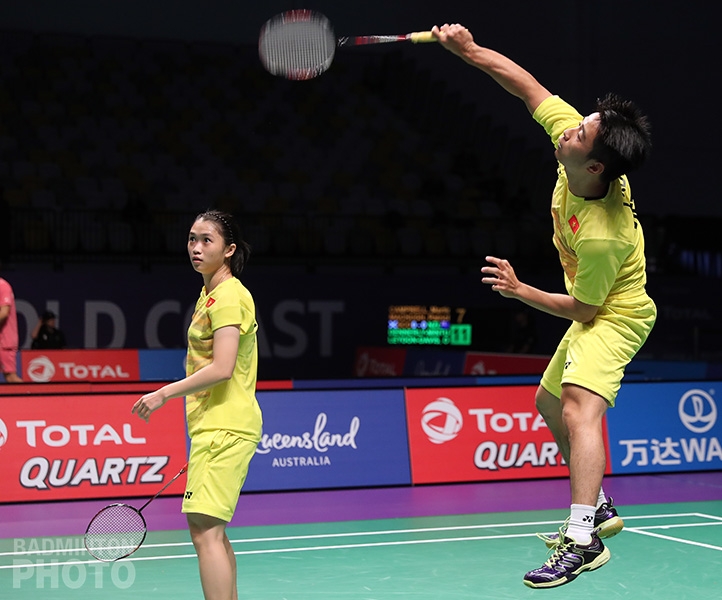
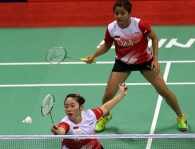
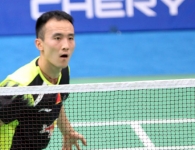

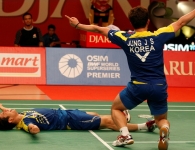
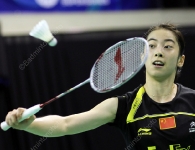
Leave a Reply